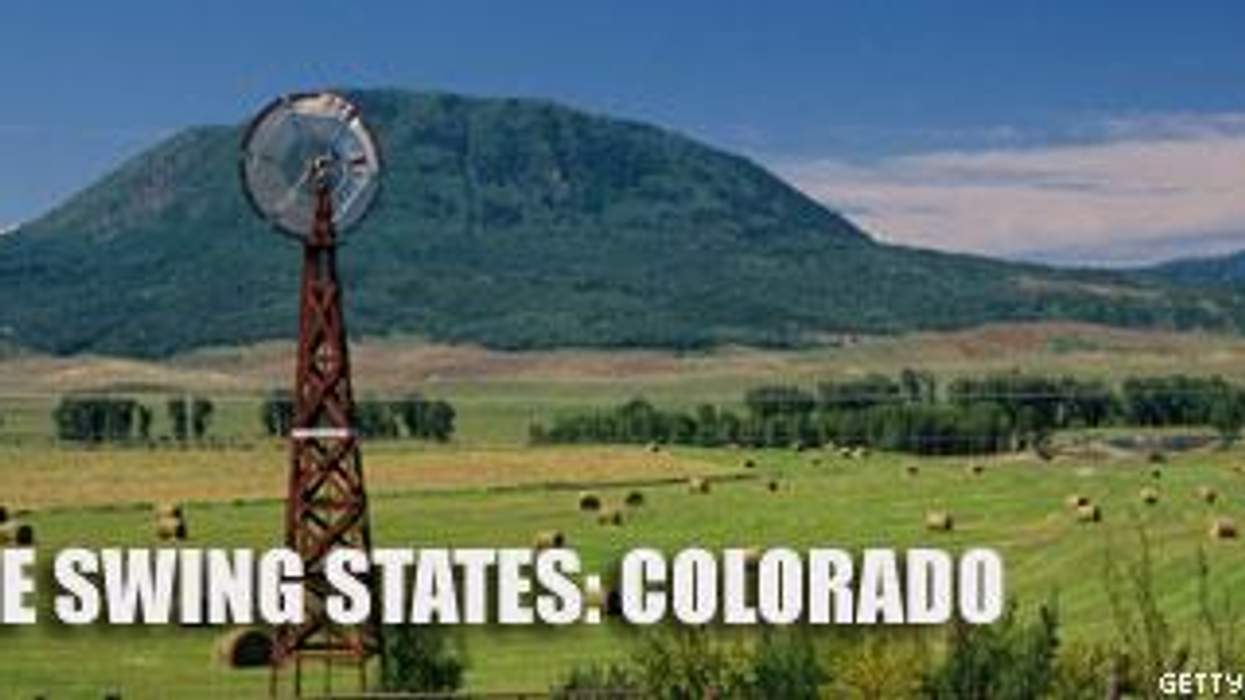Target State: Colorado
Electoral College Votes: 9
Voted for Bush: 2000 & 2004
Governor: Bill Ritter, Jr. (D)
State Senate: 20 Dem, 15 GOP
State House: 39 Dem, 26 GOP
Races to watch: Jared Polis, openly gay
candidate who is expected to win Colorado's 2nd
Congressional District; Rep. Marilyn Musgrave, Federal
Marriage Amendment author, who is in a tight race to
keep her congressional seat.
***
Although Colorado
twice voted for George W. Bush in 2000 and 2004, the
state has been trending Democratic at a local level for the
past two elections. Going into the 2004 election, the
GOP controlled both state legislative chambers, 18-17
in the Senate and 37-28 in the House. Coming out,
Republicans lost control of both bodies, with the Dems
taking a 1-seat advantage in the Senate and gaining a
35-30 edge in the House. In the 2006 elections,
Coloradans voted to give Democrats a commanding lead
in both chambers -- 20-15 in the senate, and 39-26 in the
house -- and they elected Democrat Bill Ritter
governor.
John Straayer,
political science professor at Colorado State University,
says the shift is partly due to the political headwind
created by an unpopular GOP president, but also the
Republican Party's emphasis on conservative
social values at the expense of bread-and-butter issues like
the economy, education, health care, and infrastructure.
"When the
recession hit in 2001/2002, the state was in extraordinary
dire straights and there were cuts in higher ed.,
highways, health care and so forth," Straayer
explains. "There was a sense that the dominant party,
the Republican Party, which had drifted further and further
to the social issues of the Evangelical right, was
pre-occupied with those issues, and was not attending
to the meat and potato stuff. I think the failure of
the Republicans explains the Dem's success more than
anything."
One Colorado
Republican who rode the Christian right's social
agenda to prominence is Congresswoman Marilyn Musgrave
-- author of the Federal Marriage Amendment -- whom
gay activists have already spent millions of
dollars trying to unseat in both 2004 and 2006.
"In fact,
of the seven US House seats, the only one that is a real
race is in the 4th Congressional with [Betsy]
Markey and the incumbent, Musgrave,"
Straayer says.
Musgrave served
in the state legislature during most of the '90s and was
elected to the US House of Representatives in 2002 by a
margin of 55% to 42%. But her re-election
races have grown ever tighter, with Musgrave
narrowly defeating the Democratic candidate in 2006,
46% to 43% (a third-party candidate won 11% of the
vote).
Straayer says
Rep. Musgrave essentially defined herself as a candidate of
the Evangelical right, which has slowly but surely become
less of a selling point over the years.
"She's got a hardcore base, but that base
does not get her to 50% and she seems to have
stalled out on that," he says. "She's
been trying to talk about other things. I think
she's understood that as she's defined
herself, there's been more and more discomfort with
her narrow agenda. Some people just flat don't
like it. And some of the others who may agree on some
of those issues have a sense that she's not broad
enough to worry about other problems."
Musgrave's
Democratic challenger Betsy Markey has opened up a lead of
several points in recent polls in what should be a safe
Republican district.
"I think
it's as much an anti-Musgrave phenomenon as it is a
pro-Betsy Markey phenomenon," says Straayer.
"[Markey's] getting to be known in the
district, but she still doesn't have deep name
recognition."
Asked if
there's any specific trend that sums up Colorado
politics over the last decade or so, Straayer points
to the number of women who used to be in the
Republican Party versus now. In the 100-member legislature
(35 House, 65 Senate), 61 members were Republican in
1998 and 21 of those GOP seats were held
by women. Fast forward to the 2008 session
completed in May: the GOP had 40 seats with women filling
just five of those slots.
"What does
that tell you?" asks Straayer. "I've
talked to a lot of [those women] and they will say,
they didn't leave the Party, the Party left
them."
As the Republican
Party became a one-trick pony on social issues, women
jumped ship he says.
"A little
more than their male counterparts, women tend to be
concerned with matters related to children, education,
health care, families... but the party veered off
into the cultural agenda direction," explains
Straayer. "That's not a policy environment
that's particularly friendly to female
candidates -- particularly if they don't adhere to
the pro-gun, anti-gay, anti-abortion agenda but want
to concern themselves with other things."
Straayer adds
that nearly half of the 60 Democrats in the legislature are
women.
Overall, the
state is leaning toward Sen. Barack Obama in the
presidential election, with recent polls giving him a slight
edge over Sen. John McCain. Though the excitement has
faded a bit since the Democratic primary ended,
Straayer still expects to see an impressive number of
voters.
"Back in
February, when we had the caucuses and the straw poll
primary, the turnout and participation was just
extraordinary," he says. "I still think
you're going to see some pretty robust turnout in
substantial measure due to excitement over
Obama."
And that should
help Democrats down the entire ticket, including Mark
Udall, who is running a tight race against Republican Bob
Schaffer for an open seat. Recent polls find Udall has
a slim advantage of just a couple points over
Schaffer, a gap that has been steadily tightening since the
summer. The seat was formerly held by a Republican.
Stay tuned to Advocate.com for more on the critical
state of Colorado this week.




































































Charlie Kirk DID say stoning gay people was the 'perfect law' — and these other heinous quotes